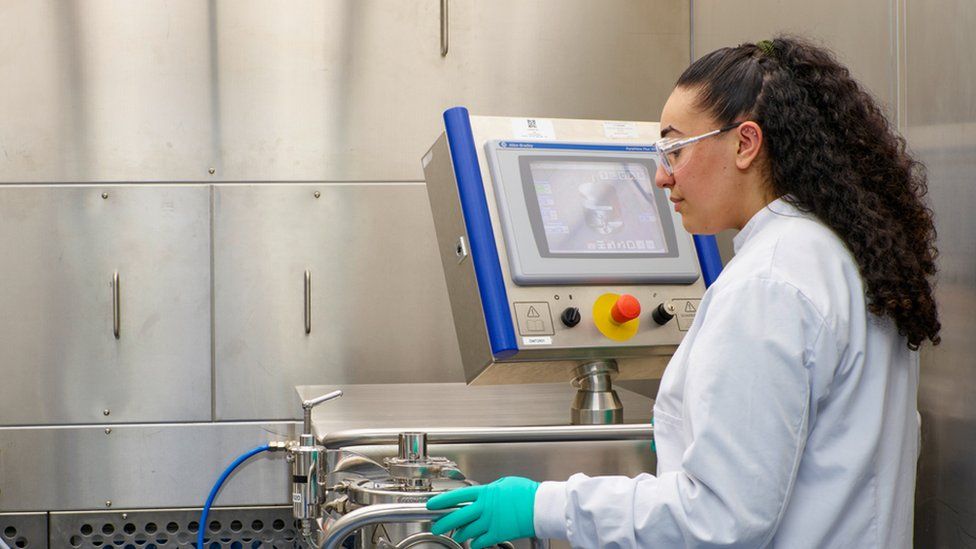UK inhaler firm Vectura backs £1bn bid by Marlboro-maker
- Published

Directors at UK inhaler company Vectura have recommended shareholders accept a £1bn bid from tobacco giant Philip Morris International (PMI).
The Marlboro cigarette maker's offer of £1.65 per share beat a rival bid from US private equity group Carlyle, whose final offer was £1.55 per share.
Vectura makes inhaled medicines and devices to treat respiratory illnesses such as asthma.
Dozens of health groups had urged Vectura to reject the firm's offer.
The health groups warned that the deal would significantly harm the future prospects of the healthcare company, as it will deter top lung researchers and scientists unwilling to work for a tobacco company.
Shares in Vectura, which counts Novartis and GSK among its customers, have soared 33% in value since Carlyle's first offer in May.
Philip Morris recently said it could stop selling cigarettes in the UK in 10 years' time as it focuses on alternatives, such as heated tobacco.
The firm indicated it would welcome a government ban on cigarettes and said "strong regulation" was needed to "help solve the problem of cigarette smoking once and for all".
However, health charity Ash said it was hard to take such claims seriously from the firm responsible for selling over a tenth of cigarettes globally.
Labour's shadow health secretary Jonathan Ashworth said: "Philip Morris's attempted takeover of a key player in lung health products beggars belief. It is bitterly disappointing that Vectura have so far failed to exercise duty of care to patients and scientists and reject this takeover by big tobacco.
"This is now a test for Sajid Javid. When we know smoking causes so much serious illness and premature death, it's time this government takes the right course, stands up to this tobacco giant and blocks this takeover."
Sources close to the deal tell me the company feels their primary duty is to shareholders and note that PMI must be allowed a chance to transition to its stated goal of deriving half its revenue from non tobacco products within a decade.
Some have also questioned whether this deal is any different in principle from oil and gas companies investing in renewable energy.
However, this decision will be treated with dismay by health groups and will disappoint many shareholder groups who hoped this deal be an acid test of whether shareholders really prized wider societal goals over getting the best price.
PMI will need to convince 51% of shareholders to take the money for it to take control. Many other shareholders may feel uncomfortable being a minority shareholder in a tobacco company subsidiary.
Concerns over takeover bid
A letter sent by more than 20 UK, US and European health organisations on Thursday had urged Vectura's board to "put sustainability and ethics first".
The signatories included the bosses of Asthma UK, the British Lung Foundation, the Royal Society for Public Health and the Royal College of Physicians, as well as public health directors of several councils and some distinguished medical professors from King's College, Imperial College and University College London (UCL).
"If PMI were to acquire Vectura, PMI could then profit from treating the very illnesses that its products cause," they wrote.
One of the health groups' key concerns is that Vectura's research links with various universities and hospitals could be compromised.
The signatories warned that Vectura could be blocked from participating in clinical trials, thus "disrupting crucial drug development".
They added that professional partnerships could also be affected, since Vectura won the most contracts in 2020 to develop treatments for respiratory disease and lung cancer.
The takeover battle began in May with a £958m bid from Carlyle, which received early backing from Vectura's board.
But on 8 August, Philip Morris increased its offer to £1.65 per share, which totalled a bid of about £1.02bn ($1.41bn) from the Marlboro cigarette-maker.
London-listed shares of Vectura closed at £1.63 on Thursday after hitting a more than five-year high of £1.76 pence on Tuesday.
Related Topics
- Published10 August 2021
- Published8 August 2021